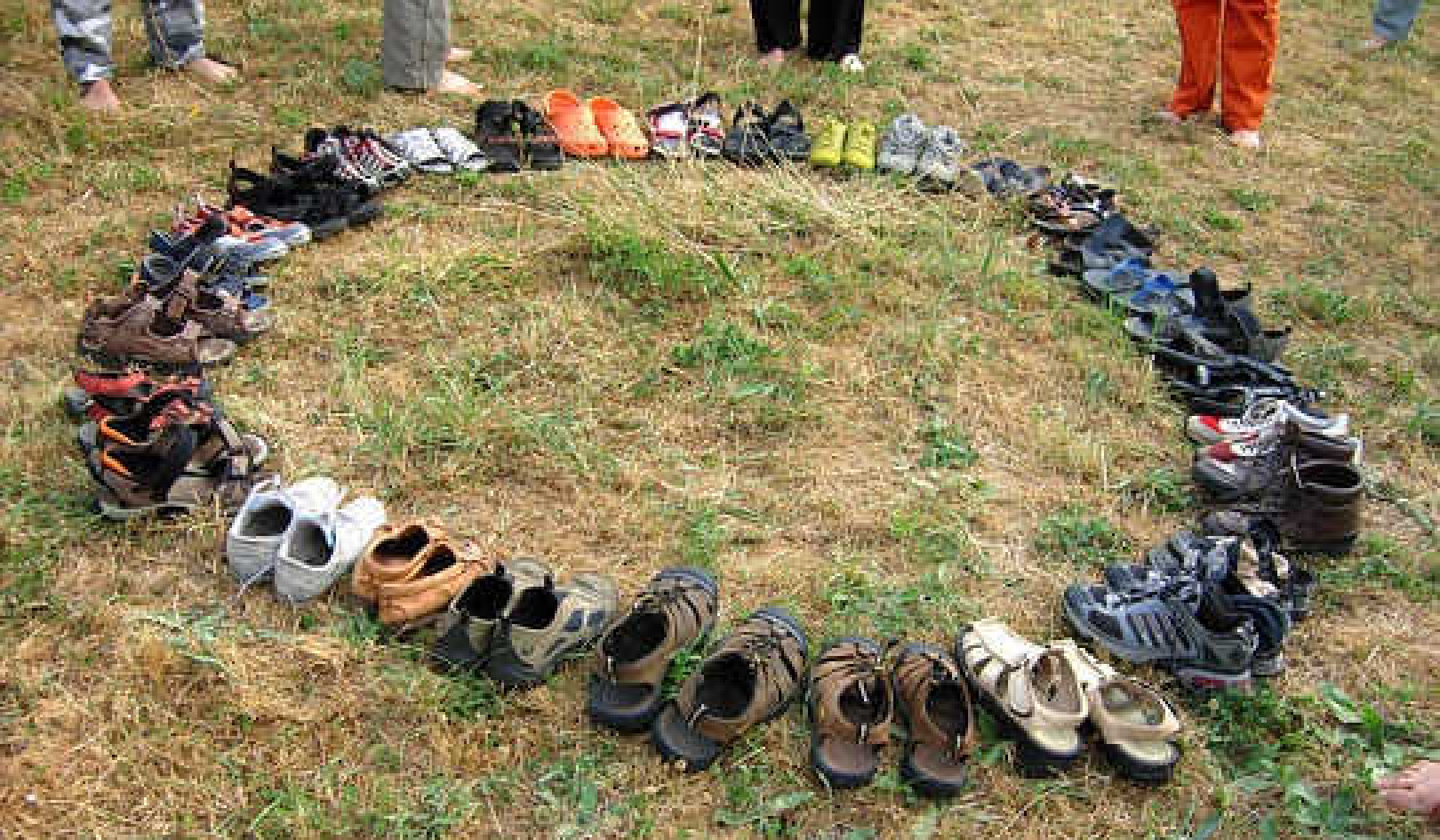
Image by Elena Chukovskaya
In her last months my ninety-two year old grandmother, Bobbie, wanted to eat only ripe bananas and chocolate candy. The competent staff in the care facility where she was being treated with great kindness complained to our family that they could not get her to eat sensibly.
Though no one is ever sure about the timing of passage, of dying, we were fairly certain she had months left, if that. We laughed and said that bananas and chocolate candy made great sense to us, and from then on, that is what she ate - that is, when she even wanted to eat.
There was a Pillsbury refrigerated bakery goods advertisement many years ago that touted baked things from the oven being equated with lovin’. In my Bobbie’s case, we loved her with bananas and chocolate. I still smile when I think of that.
Time for Toddy?
About the time of my father’s last hospitalization, we had encouraged his home caregivers to listen closely to his needs and be certain he was comfortable. Each day, he awakened fairly early, had breakfast, was up a short while before his morning nap, then had lunch, followed not long after by an afternoon nap after which he would be up for a short while before his evening bourbon, then supper, and shortly after to bed for the night.
One morning, when he first awakened, he said to his morning caregiver, “That was a really good nap. It must be time for my toddy." Dad’s late-afternoon routine included a bourbon and water that he sipped slowly before having his supper; he looked forward to it. The caregiver caught the phrase and realized Dad thought it was afternoon. Good for her. And without missing a beat, she asked, “Is that what you want?”
After helping him to the bathroom, she brought him his drink, and then she fixed his supper -- rather than his usual breakfast. He was happy and later went back to bed for a good night’s sleep. When the replacement caregiver came, she was told the story. When Dad next awakened just before lunch, the exact same sequence occurred as it did again at the normal supper time. We were delighted! He had eaten and slept well and was comfortable and happy - three bourbon and waters, three suppers.
It’s interesting to note that particular confusion was never repeated. But when it happened, he had been given loving care. Not arguments or corrections - just love.
The dying often breathe through their mouths. Hospice nurses usually explain to families how to use glycerine swab sticks for moistening the mouth, tongue, gums, or lips. Some are even lemon flavored. But some families have chosen, instead, to dip swab sticks into their loved one’s favorite beverage. For my father that would have been bourbon, if we had thought to do it.
Sharing Love and Laughter
“I don’t want anyone to see me without my makeup,” Carrie told her daughters from her hospital bed. Her hairbrush was gently used and makeup carefully applied by her daughters during the hours of her last days. Hearing being the last of the senses to go, surely she could share their happiness in the teasing they did of each other as they enjoyed for the last times doing girl things with their momma, loving her and each other in that special way.
In Peaceful Passages, Janet Wehr,RN, tells the story of a gentleman who required a urinary catheter greeting a new hospice nurse. She told him she would be changing the catheter. As soon as she pulled up his hospital gown, she heard him muttering about people calling men’s genitalia privates. He declared his should be called his publics. They had a good laugh!
During her mother’s final hours, my friend Venessa sat by her mother’s bed and held her hand. When Venessa began singing one of her mother’s favorites, she felt their love when her mom, no longer able to talk, squeezed her hand. She can still feel that last special physical sharing of love.
Maw-maw was approaching her hundredth birthday. With a touch of the flu, her body weakened quickly. Within days, the family had gotten a hospital bed for her, and hospice help had been arranged. Her decline hastened. Family gathered around.
One granddaughter told me they played Maw-Maw’s favorite gospel songs. As Elvis sang “How Great Thou Art,” no longer able to speak and only a few hours from departing her body, Maw-maw lifted her hands and moved them in time to the music - ”like she could see the rapture,” laughed her lovingly amused granddaughter.
Lovingly Honoring Requests
Declaring that our births and deaths are perhaps the two most important frames of life, a physician described in a Wall Street Journal article how his team assisted a family in honoring a loved one’s deathbed request for submersion baptism. The team arranged for an inflatable pool to be filled in the ICU, first using a bucket brigade and then rigging a dialysis tube to circulate a stream of warm water. Then a patient-transfer lift lowered the patient, his ventilator temporarily unplugged, into the pool where his Baptism occurred. The patient came out smiling. A palliative care social worker sang “Amazing Grace.”
An email let me know that a mutual friend was in intensive care in a local hospital. Sixty-five year old Ted had called out to his wife, “I can’t breathe!” She called 911. He said later he felt as though he was suffocating.
He remembered little after the paramedics arrived nor through his ten days in cardiac intensive care at a nearby hospital where he was intubated, machines breathing for him. He was later told that his lungs, swollen with fluids, were strangling his heart. His heart stopped twice; he died twice. Both times he was resuscitated. He was moved to a private room and remained comatose and unresponsive, only exhibiting brief responsiveness a couple of times.
Love Comes Calling
A physician suggested identifying some kind of stimulation to bring Ted fully back. His wife turned to Ted’s life long friend, Morris, who on some visits had left crying, fearing Ted was not going to recover. Morris had visited him often. A fellow amateur radio operator, Morris put a stimulation plan into action, returning to Ted’s room with a handi-talkie (handheld radio).
Morris began talking very loudly to him by his call letters. Then he put his fingers in Ted’s hand saying, “If you can hear me, squeeze my hand.” Feeling his hand being squeezed, Morris began speaking even more loudly, proclaiming success.
He excitedly set up the radio and charging unit on a shelf and left to contact other amateur radio folks, telling them that Ted would be listening but unable to speak. Using an emergency practice net fortunately scheduled for that night, person after person after person began loudly contacting Ted by his call letters and his name, wishing him well for a speedy recovery. He did regain consciousness. He could neither move nor speak, but he could produce tears and feel them streaming down both cheeks.
After hospitalization, he learned of the prayer groups and chains that had been formed on his behalf, composed of family members, friends and the many ham operators worldwide who were praying for him. He learned of requests for prayer in church bulletins of several denominations. He professed his gratitude to them all. He has said to me, “I firmly believe that those prayers are the reason that I am here today. Prayers Really Work.” As this was written months later, Ted had not fully recovered but was well on his way.
A highly intuitive person, former Silva Method instructor, and law-related professional, Ted had always been open to anomalous or mystical experiences. He acknowledged that since dying twice he feels, as I have when near him, that he has a crowd of loved ones no longer in physical bodies or perhaps of angels assigned to assist him in the work that he has left to do. His return from death, he said, has made him even more spiritual, more convinced of the power of prayer, and more appreciative of fully living for what lies both ahead… and, eventually on.
From Heart to Heart
Missy recalled that her last cherished memorable time with her mom, Emily, was actually the weekend before she passed. She had driven from Knoxville, Tennessee to Louisville, Kentucky, on Friday night and planned to stay until Monday morning. Emily had some chores for her to do, running some errands and taking cookies to a neighbor. She recalls her mom always thinking about others before herself.
Molly had brought the next-door neighbor’s kids a gingerbread house to build. Emily was thrilled; she wasn’t able to get them a gift, but this was perfect in her eyes. Over the weekend, she wanted Molly to help her gather gifts for the family since Hanukkah was quickly approaching. Doing so filled the weekend with buying the gifts Emily wanted to share with their family.
By Sunday, together they had managed to get the job done. Everyone had a gift. At her mom’s request, Molly even wrapped the calendar Emily was giving her. Little did they know her mom would pass away three days later. Molly still has that calendar wrapped up and says, “I will keep it forever because it was a gift from Mom’s heart to mine.”
It's Never Too Late To Say "I Love You"
Raven, a woman not known for offhand nor effusive statements of love to visitors, was being treated for end-stage cancer in her local hospital. Through blinding snow and over icy roads, friends and family visited. To their shock, surprise, and delight, Raven reached out to each of them and said “I love you.” Her breathing became labored, her eyes more closed than open.
Raised in the Roman Catholic church, she had not been a church going, practicing Catholic in many years, but she asked for a priest to come and administer last rites. Those who cared most encircled her bed, staying connected and hoping she could feel their love. In the early evening before her death the following midday, Raven rapidly raised her arms upward and loudly said “Wahoo!” What a joyful parting gift.
Coping Through Laughter and Tears
Having joyful things to think about is helpful. We all know, though, that we have many times where tears are helpful, too. Tears can release feelings, can be eye lubricants, and can sometimes remove stress or improve moods. They do not erase the reason we are sad, but they clear the path to remember our joy - our love.
Through the laughter and the tears, we cope. We do the best we can. There are ways we might do better, be more comfortable. If we have some tools and ideas for improving on guessing, rather than simply reacting, we have a better chance to be proactive.
Copyright 2018 by Lynn B. Robinson, PhD
Article Source
Loving to the End…and On: A Guide to the Impossibly Possible
by Lynn B. Robinson, PhD
 Dr. Robinson recognizes and encourages ways for anyone—everyone—to love beyond death in this well-researched, engaging, and compelling mix of personal narrative and forthright reporting on end-of-life care and mis-care. Helpful for both families and medical personnel, it is part instructive manual, part counselor, and part love story. Her book gently guides us through the sadness of departure toward opportunity and love. Never demanding readers believe in an afterlife, Robinson instead offers personal stories of death bed visions, after death communication, near death experiences, and end of life care.
Dr. Robinson recognizes and encourages ways for anyone—everyone—to love beyond death in this well-researched, engaging, and compelling mix of personal narrative and forthright reporting on end-of-life care and mis-care. Helpful for both families and medical personnel, it is part instructive manual, part counselor, and part love story. Her book gently guides us through the sadness of departure toward opportunity and love. Never demanding readers believe in an afterlife, Robinson instead offers personal stories of death bed visions, after death communication, near death experiences, and end of life care.
Click here for more info and/or to order this paperback book. Also available in a Kindle edition.
About the Author
 Lynn B. Robinson, PhD is a professor emerita of marketing and a former business consultant, an author and speaker, a hospice and community service organizations volunteer, and facilitator for a local affiliate of IANDS, she is the author of Loving To The end…And ON. Visit her website at: www.lynnbrobinson.com
Lynn B. Robinson, PhD is a professor emerita of marketing and a former business consultant, an author and speaker, a hospice and community service organizations volunteer, and facilitator for a local affiliate of IANDS, she is the author of Loving To The end…And ON. Visit her website at: www.lynnbrobinson.com


























